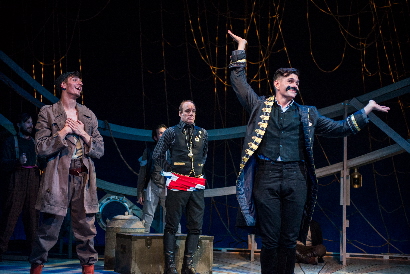
Matt Sawalksi, Tom Wahl and Nicholas Richberg celebrate the ridiculous in Theater Up Close’s Peter and the Starcatcher / Photo by Justin Namon
October and November are jammed with openings, as many as seven in one week. To find reviews of all the current productions, click on the “Reviews” tab in white letters in the teal bar in the upper left-hand corner.
By Bill Hirschman
Peter and the Starcatcher, an alternative origin story for Peter Pan, is an ensemble piece featuring a dozen chameleonic storytellers, each with moments in the spotlight.
But Theater Up Close’s profligately imaginative romp primarily aimed at adults is notable for standout performances by two individuals. Abigail Berkowitz, a student actress in her first professional production, makes a promising debut playing Molly, the strong-willed adolescent who allies with Peter. Then there’s the glorious star turn of veteran Nicholas Richberg as an intentionally over-the-top pirate captain, Black Stache.
This partnership production of the Arsht Center and the University of Miami Department of Theatre Arts is further elevated by a from-scratch re-imagining of the 2012 Broadway hit by Henry Fonte, producing artistic director of the Jerry Herman Ring Theatre and director of UM’s conservatory programs. Finally, relish a thespian’s playground set by Yoshinori Tanokura representing sailing ships and crannies on a magical isle featuring an undulating roller-coaster of a catwalk across the back of the set.
Slyly irreverent and surreptitiously touching, Starcatcher is awash in high and low humor, ranging from a riff on a John Donne 17th Century sermon to a 21st Century Verizon commercial to a timeless fart joke.
Peter and the Starcatcher is inspired by, but not slavishly faithful, to the 2004 children’s book written by Dave Barry and Ridley Pearson. It was adapted by Rick Elice (Jersey Boys, The Addams Family) with a subtler humor that would appeal to adults while the spectacular histrionics keep younger folks amused.
Technically, it’s a prequel to J.M. Barrie’s Peter Pan, or The Boy Who Wouldn’t Grow Up. But it’s really a parallel world narrative that Barrie wouldn’t recognize. Unfamiliar characters and situations are spun through a different journey until we end up back again at the familiar starting point of Barrie’s narrative.
Knowledge of Barrie’s series of novels, his plays, the Peter musicals or animated films is unecessary. But the more you know, the funnier and more satisfying Starcatcher is when you discover why the heroine is called Molly not Wendy, or why the magic isle here is called Mollusk and the ship that takes the lost boys to it is called Neverland. It all comes together by the most circuitous route.
Like the original New York production, Fonte loves to use gimcrack jerry-rigged theatricality, which makes fun of theatricality itself while honoring it. For instance, a ship’s vicious cat has been dipping into the fairy dust and now is flying around our heroes’ heads. Okay, what it really is a mangy cat doll attached by a long string to a pole and being whipped around by an actor standing on a balcony two feet away. It’s both an imaginative solution and so intentionally hilariously lame.
Still, much of the humor will go right over the heads of pre-teens and even adolescents. There are a few nasty words and a lot of tame but pointedly sexual jokes such as someone saying to “take her below” decks.
And buried deep underneath the fun are Barrie’s messages about childhood, adulthood and the painful difference between fairy tales and the grown-up world. For instance, Stache says more than once in frustration at the youngsters’ antics, “I hate children.” That’s funny. But the physically and mentally abused Peter says several times, “I hate adults; they lie.” That’s intentionally darker territory.
The evening is told á l a The Adventures Of Nicholas Nickleby by a troupe of itinerant actors sharing in the narration of the story, handing off the tale to each other a sentence at a time like a relay baton.
The Byzantine plot defies simple description. It starts in Victorian England when three orphans (including a boy without a name who will become Pan) are sold into slavery aboard a ship carrying a treasure chest for the Queen to a faroff country. On that ship is the self-assured Molly who yearns to prove her intelligence, resourcefulness and capability to her father Lord Aster (Tom Wahl) who is sailing on a second decoy ship secretly run by the infamous pirate Black Stache. From there, it gets really complicated.
There are hundreds of daft and dopey bits like having the cannibals on the island speak a gibberish, which is really a list of Italian cuisine. Sailors swimming through magic dust at the end of the first act appear at the top of the second act as a kick-dancing chorus line of mermaids.
Plus, the more likely you are to win a Jeopardy competition, the more you’ll savor this show. For instance, Stache, who fancies himself a cultured and erudite soul, says, something is “as elusive as a melody in a Phillip Glass opera.” Okay, first, that’s a funny line if you know how stubbornly inaccessible Glass’ work is; second, it’s funny that Stache would flaunt his knowledge by choosing such an obscure reference.
This fourth collaboration between the Arsht, some professional mentors and apprenticing UM students marks the first time that Fonte and his students have prevailed with no asterisks. Previous productions have resulted in visually exciting tableaus and boasted admirable work by the professionals. But the students’ ability had not developed to the point that they could master the challenge of what they were attempting.
The production is funnier in the second half than the New York version, but it isn’t quite as vibrant in the first act. Part of that is because Elice’s script is so laden with exposition that you are guaranteed to be lost yourself. It takes an entire cast of seasoned professionals to make it work. But the audience should just let go and allow the tide of names, places and relationships wash over them like the names in a Russian novel. Trust these folks; most of it will come clear over time.
They are an ensemble in which every actor plays bit parts, makes sound effects, hauls on props to make makeshift scenery and everyone has at least one identifiable character. The group include Wahl, a Carbonell-winner for I Am My Own Wife, and UM students Timothy Bell, Timothy Boehm-Manion, Robert Fritz, Alejandro Gonzalez Del Pino, Thomas Jansen as Molly’s duenna, Michael Mancini, Liam Merkle and Matt Sawalski as Stache’s loyal lieutenant Smee.
UM senior Joshua Jacobson slowly gains attention as his character, the no-name orphan, grows in confidence (thanks to Molly) until he emerges at the end as the heroic Peter Pan. It’s a clever device that Barrie’s iconic hero starts as a cringing non-entity who is almost invisible for a third of the play.
Berkowitz, a senior from New Jersey, could not be better as the precocious go-getter whose inability to disguise her genuine superiority is off-putting to her shipmates and endearing to any of us who have ever believed that we were, indeed, the smartest person in the room. With her round face, wide eyes and long red pigtails like floppy ears, Berkowitz communicates Molly’s confidence in her innate smarts and her pain from a lonely disconnectedness. She perfectly inhabits that terrible place of adolescence in which you are courageously eager to prove yourself and terrified of the exact nature of the consequences you might face. Berkowitz’s career is something to follow after her graduation.
But saving the best for last is Richberg who last season hit home runs as John Wilkes Booth in the musical Assassins and the troubled protagonist in The Great God Pan. This is one of the best demented daffy comic scene-stealing performances seen in South Florida in many, many seasons, equaled only by Todd Allen Durkin in Fox on the Fairway last year.
Donning a painted-on thick droopy moustache like the one Groucho daubed on, Richberg and Black Stache both consciously purloin every scene by chewing every bit of scenery in sight. The facial mugging, the grandiloquent language, the outsized posturing is on a scale that most actors would be terrified to even attempt for fear of embarrassment. But Richberg dives into an entire pool of ham and corn and luxuriates in the sublime silliness.
There ought to be a new Carbonell category next year so Richberg can win it: The Oh My God category. Using just those three words repeated over and over and over and over, plus a rogue’s gallery of pained expressions, Richberg delivers a triumphant tour de force in acting by investing each reading with a different spin, each funnier than the last – we’d guess lasting a very long minute and a half when Stache gets his hand caught in a treasure chest. You have to see and hear it. Several of the young actors watching him had to hide their mouths with their hands (like actors did during skits on The Carol Burnett Show) because they were losing the battle not to crack up on stage.
In New York, the production was set on a basically bare stage transformed bit by bit with the addition of props and set pieces. But Tanokura has created a massive fantasy environment stretching across the Carnival black box theater with stairs, ladders, portholes, weather wooden planks, rope ship’s rigging and the snake-like catwalk.
Master artist Ellis Tillman has also indulged his imagination with a motley of collection of Victorian costumes from the bedraggled stained rags of the orphans to the grand long coat with gold trim favored by Black Stache.
Finally, props to Fonte for the swirling non-stop action and the literally hundreds of jocular director’s touches. As he did with Metamorphoses last year, he blacked out all the stage directions included in the script from the New York production. So every move you see, every idea was either invented by him, his creative team or his cast.
With mysterious amulets, hijackings, shipwrecks, swordfights, pirates, lost boys, treasure chests, magic dust, woeful British accents and fart jokes – how can you go too far wrong?
Peter and the Starcatcher, part of the Theater Up Close series with the University of Miami Department of Theatre, runs through Oct. 26 at the Carnival Studio Theater, Ziff Ballet Opera House, Adrienne Arsht Center, 1300 Biscayne Boulevard, Miami. Performances are 8 p.m. Wednesday-Saturday, 3 p.m. Saturday, 4 p.m. Sunday. Runs about 2 ½ hours including one intermission. Tickets are $45. Call (305) 949-6672 or visit www.arshtcenter.org.
To read a feature story about the student-professional partnership, click here.










 A PaperStreet Web Design
A PaperStreet Web Design
